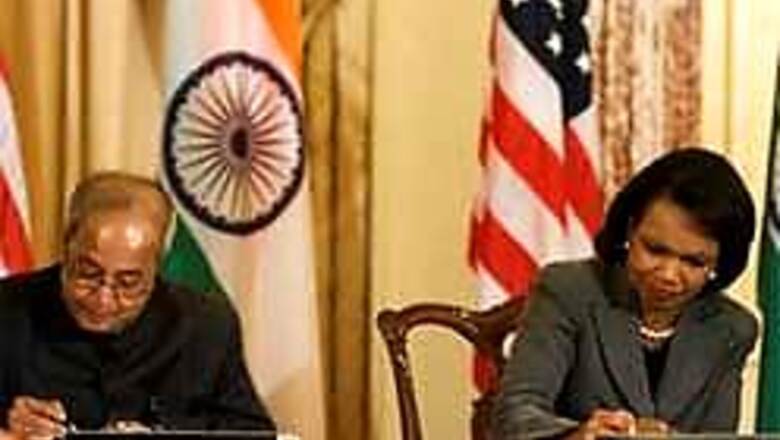
views
Washington: With India's concerns over India-US civil nuclear deal met, External Affairs Minister Pranab Mukherjee and Secretary of State Condoleezza Rice signed the bilateral 123 pact - the final document of the Indo-US nuclear deal - to seal the landmark accord.
Mukherjee and Rice inked the "Agreement for Cooperation between the Government of India and the Government of the United States of America concerning Peaceful Uses of Nuclear Energy" in the Benjamin Franklin Room of State Department at 01:30 hrs IST on Saturday, with New Delhi insisting that the accord is "legally-binding" on both sides.
This assumes significance since the US had said that the contents of the 123 Agreement were a political commitment and not legally binding, triggering concerns in India over aspects like promises on nuclear fuel assurances.
"Both India and the US Administration have now completed all our internal procedures to be able to sign this path breaking agreement," Mukherjee said after signing the agreement, paving the way for entry of American companies into the Indian nuclear market after three decades.
"Today is an important day for India-US relations, for global energy security and for our common endeavour to promote sustainable development while addressing environmental challenges," he added.
"We now look forward to working with US companies on the commercial steps that will follow to implement this landmark agreement," Mukherjee said.
The External Affairs Minister described the agreement as the first step to India's cooperation with the rest of the world in civil nuclear field.
PAGE_BREAK
"By reinforcing and increasing the nuclear element in the country's energy mix, which is vital to sustain India's growth rate, nuclear power will directly boost industrial growth, rural development and help expand every vital sector of the country's economy. It enables India to respond with her global partners to the challenges of climate change and global warming by strengthening her own economic growth and sustainable development," he said.
Mukherjee said the wide-ranging initiatives announced by Prime Minister Manmohan Singh and President George W Bush in July 2005 and March 2006 have led to a transformed relationship between the two countries.
Praising Bush, Rice and the American Congress besides the Indian-American community for making the agreement a reality, the External Affairs Minister said New Delhi looks forward to working with Washington in other fields as well.
He listed these as combating terrorism, containing and fighting pandemics, climate change, ensuring food security, cooperating in disaster relief operations and other regional and global initiatives.
Earlier, Rice said that the 123 Agreement was unprecedented and demonstrates the vast potential for strategic partnership between India and the United States.
She said the nuclear deal is not just nuclear cooperation.
"Today we look to the future, a shared future. Let us use the partnership to fight against terrorism, to try a new socialist agenda for the 21st century. India and the US can do all these together. Now there is nothing we cannot do," the Secretary of State said.
PAGE_BREAK
Prime Minister Singh "literally risked his political future" for the Indo-US nuclear agreement and remade his Government again with the support he needed, Rice said, referring to the withdrawal of support to the UPA Government by the Left parties.
DELAYED BY A WEEK
The two had failed to sign the agreement to resume nuclear commerce after 34 years, when Rice visited New Delhi last weekend with India concerned over a couple of riders relating to fuel supply assurances and reprocessing in the legislation approving the deal.
The landmark accord envisioned by US President George W Bush and Indian Prime Minister Manmohan Singh on July 18, 2005 will end the ban on nuclear trade since India conducted a "Peaceful Nuclear Explosion" in May 1974.
Mukherjee was in the US to sign the bilateral agreement just two days after Bush signed a historic enabling law with an assertion that it does not change US commitments on nuclear fuel assurances and reprocessing of spent nuclear fuel.
"By undertaking new cooperation on civil nuclear energy, India will be able to count on a reliable fuel supply for its civilian reactors," said Bush as he signed into law the Congressional approval of what he called a "big deal" at a White House ceremony on Wednesday.
An accompanying presidential statement made it more explicit.
"The legislation does not change the terms of the 123 Agreement as I submitted it to the Congress," said Bush. It simply enabled him to bring the bilateral agreement "into force and to accept on behalf of the United States the obligations contained in the agreement".
"The agreement grants India advance consent to reprocessing which will be brought into effect upon conclusion of arrangements and procedures for a dedicated reprocessing facility under IAEA (International Atomic Energy Agency) safeguards," he said.
"In addition, the legislation does not change the fuel assurance commitments that the US government has made to the government of India, as recorded in the 123 Agreement," Bush maintained.
India's ambassador to the US, Ronen Sen, told reporters after the signing that the presidential statement with assurances on fuel supplies and 'advanced consent' for reprocessing "absolutely" met India's concerns.
"I think President Bush's statement speaks for itself. All concerns that have been expressed who fear the implications of certain elements of the legislation. All those have been met," Sen said.
"I am confident because we negotiated the 123 Agreement with great care and I was confident right from the beginning that many of the concerns that had been expressed would be met like they have been in the past," he added.
Asked about apprehensions that Washington could ask others in the Nuclear Suppliers Group to cut off fuel in the event of an atomic test by India, he said: "I think we can keep on having questions and discussions repeatedly."
"I feel we should be a little more confident of ourselves. We should have a little bit more self-esteem and we should not always require these reassurances. We should grow up. I feel this very strongly," Sen said.


















Comments
0 comment